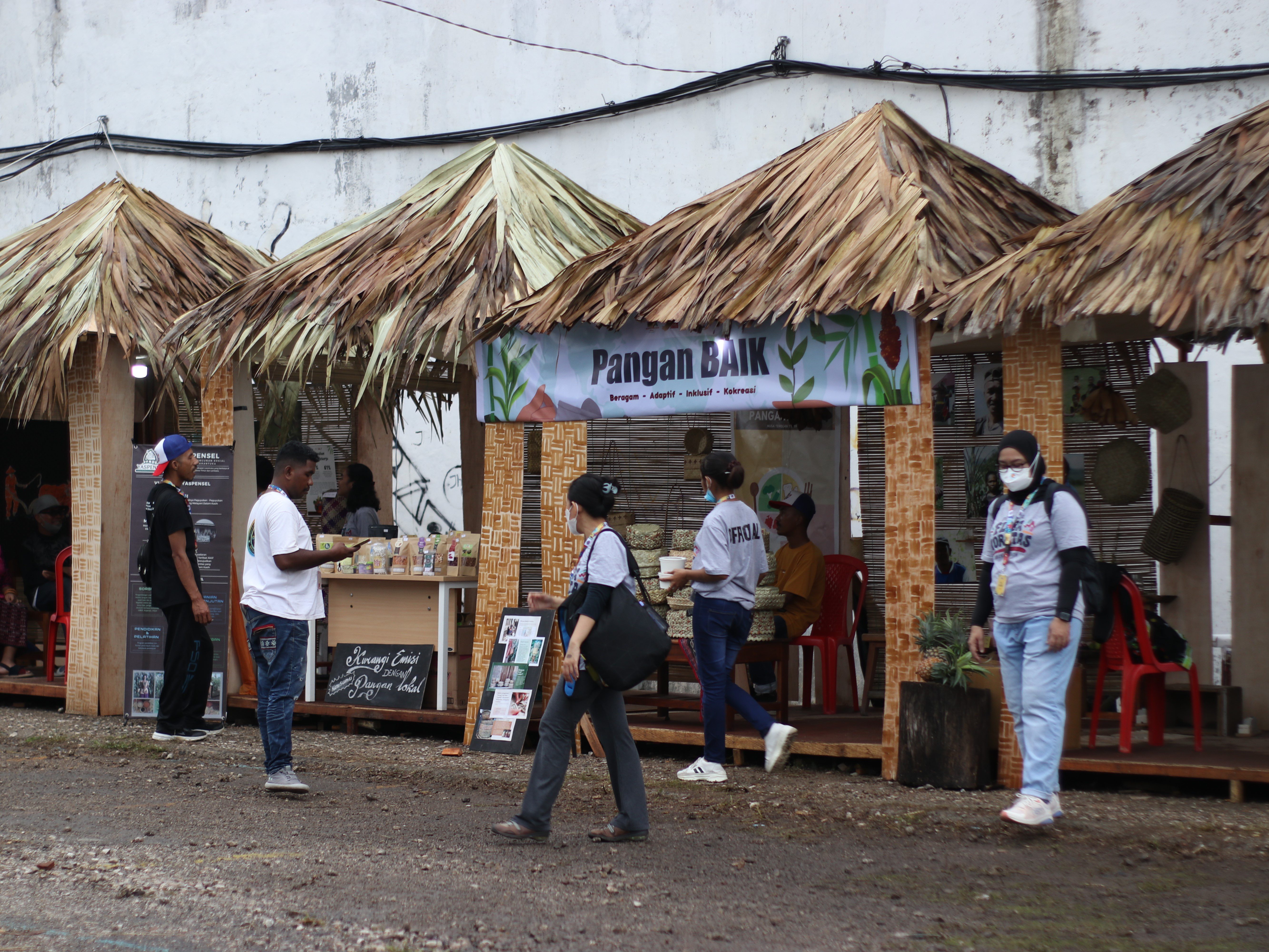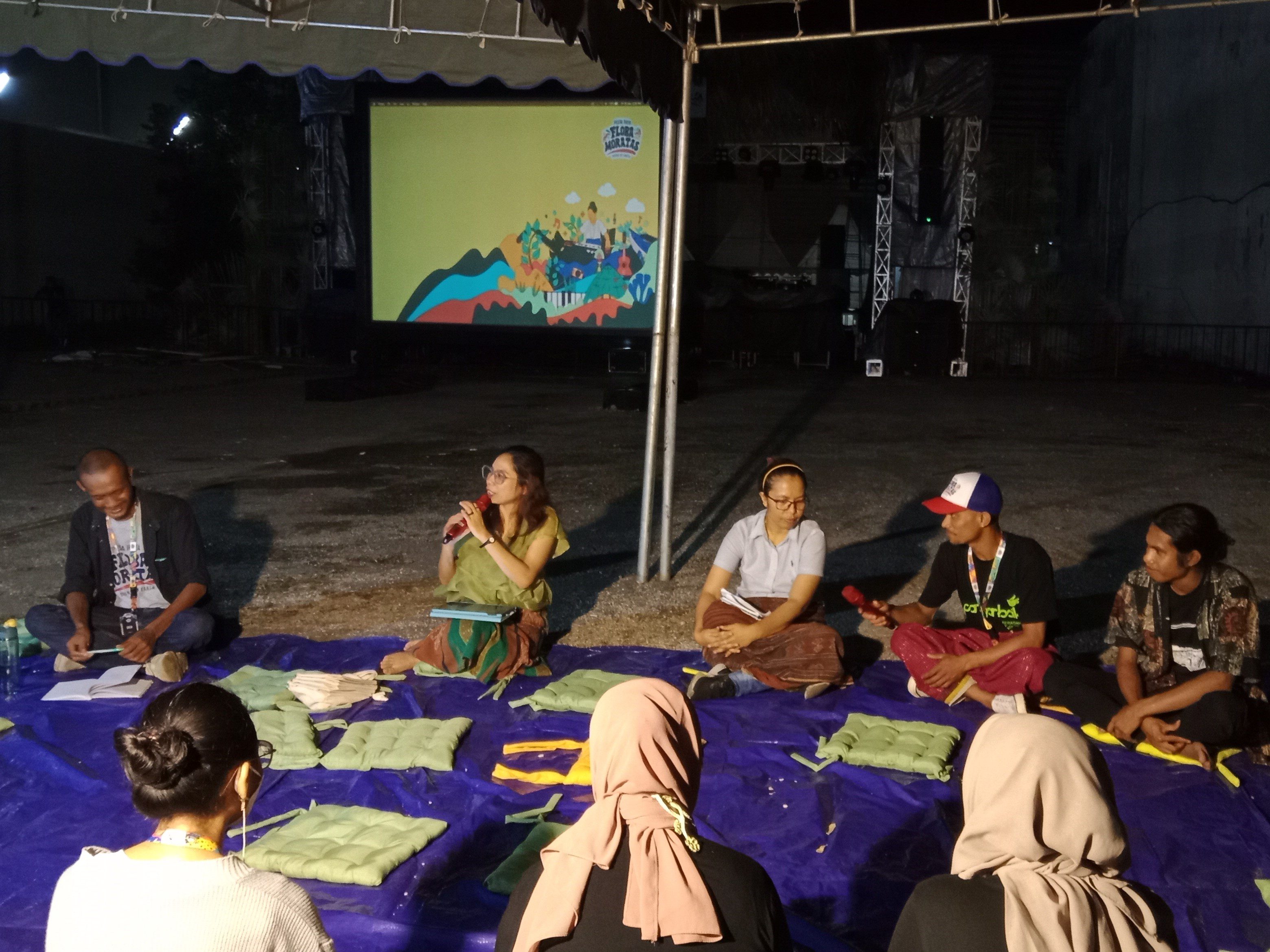FLOBAMORATAS FAIR Climate Voice from East Nusa Tenggara

Pekan Raya Flobamoratas di Kupang NTT pada November 2022 lalu membawa misi membangkitkan kesadaran tentang dampak perubahan iklim yang meluas terutama sektor pangan.
-
Date:
31 Mar 2023 -
Author:
WIT Indonesia
It is critical to address the effects of climate change in the East Nusa Tenggara region. The quality of life in the neighborhood is impacted by this circumstance. Water shortages, the spread of plant pests and diseases, and rising temperatures are all consequences of shifting rainfall patterns. As a result, public awareness of climate change and its influence on the food sector and the social lives of NTT residents persists.
If youth in NTT attended a citizen journalism workshop in mid-March 2023 to learn how to speak up for climate justice problems in an active and autonomous manner, the Flobamoratas Fair would have taken place in Kupang NTT in November 2022.

Koalisi Pangan BAIK (Beragam, Adaptif, Inklusif & Kokreasi) menyuguhkan potensi pangan lokal berbagai daerah, seperti Flores Timur, Lembata, Manggarai, dan Manggarai Timur. (Foto : KEHATI)
The VCA Alliance, or Voices for Just Climate Action, was the driving force behind the Flobamoratas Fair. In order to carry out the BAIK Food Coalition program, the Hivos Foundation supports the VCA alliance, which includes KEHATI Foundation. AYO Indonesia Foundation, Ayu Tani Mandiri, and YASPENSEL (Larantuka Socio-Economic Development Foundation) are some of the local NTT groups that KEHATI collaborates with in Flores and Lembata. KRKP (People’s Coalition for Food Sovereignty) is also a partner.
The Flobamoratas Fair is an initiative to keep advocating for climate action for rural communities and marginalized groups, with the theme “Fair for All, Fair for the Planet.” It is intended that this educational exercise would be made available nationwide and repeated in other areas, according to Benedicto Reynalda Vili Brian, the field supervisor from the Larantuka Socio-Economic Development Foundation (YASPENSEL).
Benedicto claims that the NTT population has always relied heavily on rice and wheat for everyday nutrition. Besides from rice and wheat, they also raise other crops like corn and tubers, but they sell the harvest to buy those commodities.
According to Benedicto, the population’s food reserves in Manggarai, East Manggarai, East Flores, and Lembata had declined by 50% during the past five years. The development of human illness outbreaks and the loss in water quality and quantity are two conditions that are even more worrisome. Crop yields are unpredictable, which disrupts household necessities.
“We still conduct outreach programs for farmers. The intention is to substitute rice and wheat with different kinds of regional food sources, Benedicto explained to the KEHATI team. The Flobamoratas Fair is one kind of socialization that has been used. It is Benedicto’s wish that this climate festival would be conducted annually in East Flores and Lembata.
According to Imroatul Mukhlishoh, KEHATI Agricultural Ecosystem Program Assistant, the BAIK Food Coalition seeks to empower and inspire women and young people to take the lead in formulating public policy. Also, it promotes the development of a comprehensive and equitable climate change program as a strategy to enhance human welfare, particularly in the food and agricultural sectors. It is anticipated that this project will be able to promote policy modifications and assistance for vulnerable populations.
Income Decline
To build capacity and create regional food products, KEHATI supports partners and local champions. Additionally, it links individuals to networks and communities that share their perspectives on climate change and the preservation of locally grown food.
A youthful generation known as Local Champions actively promotes local food preservation and climate change awareness in the Manggarai, East Manggarai, East Flores, and Lembata Regencies. The next step is to involve stakeholders and find financial sources. They generally act on climate issues in accordance with what is possible in their local locations.

eserta memberikan edukasi varian pangan lokal kepada pengunjung Pekan Raya Flobamorantas. (Foto : KEHATI)
According to Iim, the chart of food production outcomes due to unpredictable weather indicates a considerable reduction in relation to climate change. Because of the disruption caused by storms and heavy rain to fishing operations, fish catches in coastal areas have also reduced. According to weather fluctuations, around 85% of farmers adjust their planting schedule. In the meantime, 70% alter the type of grown plants.
The diminution in revenues brought on by climate change, according to Maria Mone Soge, also known as Shindy Soge, a local champion from Hewa Village, is affecting people’s ability to make purchases, pay for education, and engage in social activities like traditional pastimes.
Social conflict might result from this, of course. The lifestyle of the residents of Hewa Village in Wulanggitang District, East Flores Regency, which is highly dependent on nature, serves as an illustration.
Shiny stated that many ladies in the village also spend their days helping their families. By working, women help to bolster the family’s income. They typically work in remote areas where there is a risk of health issues, sexual harassment, and there have even been numerous occurrences of rape.
As a local activist, Shindy encourages people to discover solutions as early preparation to meet climate change. Shindy also works with the younger generation of Kame Gelekat Lamaholot members in East Flores and Lembata on conservation projects.
Shindy works as an honorary instructor at SMAN 1 Wulanggitang every day. In addition to being a farmer, he also works as a motorcycle taxi driver. Shindy instructed his students to plant horticultural vegetation in the schoolyard as part of a gardening project. After serving as his village’s climate ambassador for a year, Shindy has gained a greater understanding of responsible environmental management as well as the variety of locally produced foods that are both sustainable and wholesome for consumers.
Climate Change Adaptation
The goal of Flobamoratas Fair is to increase public awareness regarding the widespread effects of climate change, particularly in the food industry. Also, communities are introduced to various local food sources and their processed goods, as well as information on how to adapt to climate change. For a local community to be resilient, local food variety is crucial.

Flobamorantas membuka ruang diskusi antar anak muda penggerak adaptasi perubahan iklim. (Foto : KEHATI)
The festival performances highlighted by young packaging include dances, graphical displays, and musical and cultural concerts. In addition, there were discussions and press conferences. In order to cover stories concerning climate change in the NTT region and how the community is coping, this Fair activity involves local and national mass media.
The BAIK Food coalition highlights the potential for locally grown food in a number of areas, including East Flores, Lembata, Manggarai, and East Manggarai. The BAIK Pangan Coalition provides processed foods including dried snails/clams, dried stingrays, nasi kaget, and putu cakes, as well as cereal crops like sorghum, barley, and adlay (coix lacryma-job).
The Mama’s Kitchen festival corner is one of the attractions. The resourcefulness of these young people sends the message that the effects of climate change have already been felt in the most basic settings, such as the family. The processing of various local dishes using traditional tools is displayed in the Mama’s Kitchen festival section.
Together with the younger generation, who is the festival’s major target demographic, many parents and even the elderly attend. Most of these young people are unaware of the potential of their local food supply. Their potential for leading climate change initiatives is anticipated to increase as they learn more about regionally specific local food varieties.
Prior to the government’s nationalization of rice, older guests were more sentimental about a variety of once-familiar dishes. Perhaps the climate from Indonesia’s east will soon be heard throughout our wonderful archipelago.
